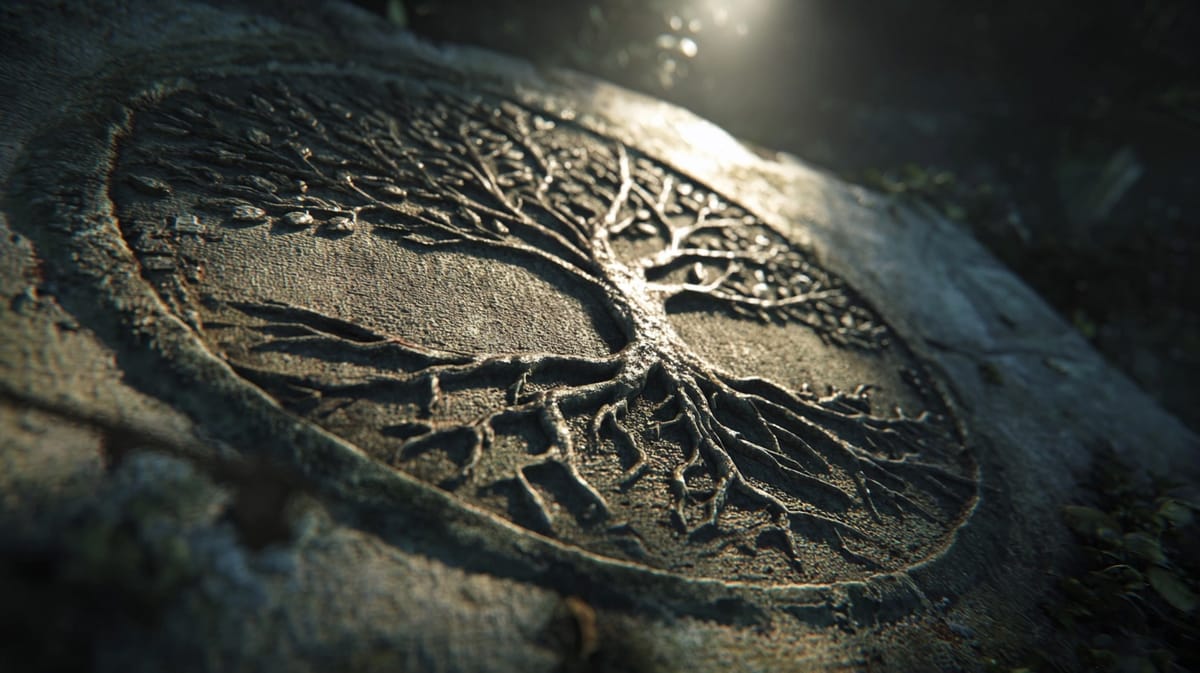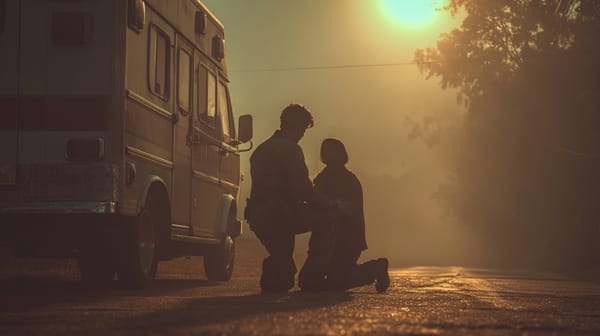Fairhaven Sermon 11-23-2025

Summary
In this week’s service, Rev. Dylan Parson explored the concept of heritage and how our family history, both recent and long past, shapes who we are today. He shared personal examples, including his academic upbringing influenced by his grandmother and his discovery of English dissenting roots (Quakers, Puritans, etc.) within his family lineage, contrasting with the fact that he’ll be the first Methodist in his direct line. He highlighted the story of a distant relative, a Kentucky Baptist preacher, emphasizing the importance of using our gifts to serve God and influence others, drawing a parallel to the biblical story of Deuteronomy 26, where Moses instructs the Israelites to offer first fruits to God, demonstrating gratitude and acknowledging God’s provision.
Parson then emphasized how the Bible itself is a collection of stories passed down through generations, shaping our understanding of God and our place within His ongoing narrative. He stressed that acts of worship, like praying the Psalms or participating in communion, are ways of weaving the past and future into our present lives, acknowledging God's blessings and offering ourselves – our time, presence, gifts, and service - as first fruits in response to His grace. He concluded by encouraging the congregation to thoughtfully consider how they can contribute to God's work, moving beyond obligation to embrace joyful generosity.
Transcript
So I'm curious if you think about it, how your heritage, both recent, more recent in your lifetime, and long past influences the way you live now. The way you understand yourself now. Our formative experiences maybe that we had as children and later and the stories that we've been told or uncovered about where we've come from, those things don't just stay confined to the past. Those things shape our identities now.
Whether we try to lean into them or run far, far, far away, that's still your heritage shaping who you are now. A few examples from my life. My grandmother was a university professor. Both of my grandparents were.
My grandmother taught English. She retired and then was dean of humanities at Slippery Rock. And so I have always just kind of been in an academic orbit. My bedroom, now my office, filled with books.
I now have books on top of the books that are going this way, and I need to do something about it. My grandmother had me immersed in the arts of all kinds from a very, very young age. To this day, nothing moves me quite the same as watching a Shakespeare play in a darkened theater. I love going to the theater.
It's just a good environment for me. Last week, I went to a one-day theology conference at Pittsburgh Theological Seminary, and I just had that feeling of familiarity, like, Oh, this is a setting that I know. This is a place where I fit really well. I got my book of communion prayers signed by the author.
It was very exciting. The one that I use every Sunday whenever we have communion. Anyways, I've gotten older, another thing. As I've entered into ordained ministry, I've sought to look back into my family's heritage.
You know, they've got some apps. The Mormons are very good at keeping family records, so they have a couple apps about that stuff. And I've looked back into my heritage to see if I have any pastoral forebears, because I don't really come from a religious family on either side. There's no pastors that I'm aware of personally.
But as it turns out, there's basically no Methodists. I'm the first one. But as far as I've discovered, there are quite a few English dissenters, which is kind of cool. The people who were fighting against the Church of England at the time.
Lots of Quakers. Lots of Puritans. Swiss and French Calvinists. and at least one Kentucky Baptist.
And that Baptist preacher, his name was Francis Davis, ordained in 1812 in Shelby County, Kentucky, in the mountains. And I found a little kind of obituary for him, or sort of a snippet about his life. And it was written about him. He was an excellent fireside preacher, but his gift for preaching was so poor that he did not succeed well in the pulpit.
But he was highly esteemed in love and continued to exercise a good influence for the master Yeah. till he fell asleep in Jesus at a ripe old age. The man used the gifts that he had to exercise a good influence as he was remembered for God's kingdom. God used what he had to offer, and that's a good heritage to hold on to.
I do have one pastor in my family who's a guy that tried his best. And so these narratives that we're immersed in, the things that we hear of what come before us, the ones that we pass down to our descendants, the stories that you tell your kids, they shape the way that we understand ourselves and the way we relate with God. Okay. And the Bible can be understood more than anything else as a collection of stories that are handed down for exactly that purpose.
Same thing. And there are very few places in Scripture that express that more readily than here in Deuteronomy 26. In many cases in both the Old and New Testaments, including probably this chapter, These stories were told and retold orally long before they were written down. And sometimes you read some Old Testament stories and you can just imagine, oh, this is a story that people would have told around a fire in the evening.
And these stories were passed around communities from parents to children in times of exile and in times of comfort. The stories went with them. So, the Bible is a book that contains law and poetry and history, as well as quite a bit of clunky genealogy. But the reason that all that matters, the reason that it's all there all together, the reason that we still hear it proclaimed every Sunday, the reason we study it throughout the weeks is because it contains the story of God and God's people.
And that story is not just past, it's not just past stories, but ongoing. We're still in the story of God's people, and so the purpose of those old stories is to shape the way we live in it now. Scripture situates us within God's story of salvation rippling out through Israel and eventually through Jesus to all the world through the church. And we're not supposed to ever be reading scripture as if it's, you know, this is what some other people were doing long ago in the past in a land far, far away.
Amen. Why would you bother? We're supposed to be reading it as if we are descendants and inheritors of the people described in it because we are. And worship, meanwhile, this. This is the arena, the theater, where we rehearse those stories collectively.
We are. And the liturgy that we pray, that we go through together, might well be described as reworking the words and the stories of Scripture to make them ours. So think about praying the psalm each Sunday, even though today's wasn't a psalm. But whenever we pray the psalm together, or whatever that prayer is from Scripture, the canticle, we take the prayer of whoever originally wrote it in the psalms, King David by tradition, and we're not just reading that psalm, we're not reciting it, we are praying it, we're making it our prayer.
And I always worry that it's easy to lose track of this whenever we pray anything responsibly on the screen, anything we read together, but we shouldn't forget what we're doing. We're not just reciting the Psalms. We are praying the Psalms the same way David did when he wrote them. The Word of God for the people of God, that's why we say that.
And consider also the communion liturgy. We start at the beginning of creation. We remember the arrival of sin into the world, Israel falling away. We recall the prophet sent to pull him back.
And then we reflect on God freeing them from slavery in Egypt. And then we turn towards the life, the death, the resurrection of Jesus. And the pastor will recite almost word for word the biblical account of the Lord's Supper. Almost all the words at the end of the great Thanksgiving, whenever I'm talking about the bread and the cup, that come straight from the Gospels.
And finally, we pray for the Spirit to come upon us and on our bread and wine like it did in the upper room. And the next thing we know, we're eating at that Passover table in the upper room at that Last Supper with the disciples. And we're eating at the Feast of Heaven with all the saints and the angels and Jesus and the company of Heaven as we pray. And that's the point of the liturgy.
We're weaving the past and the future into our lives together right now. We're part of it. That's the whole point. That's why we use these words.
And so I hope now you can see what I'm getting at as it relates to Deuteronomy 26. Deuteronomy 26 that we heard Flo read this morning should be understood as liturgy itself. These words that we heard spoken from God to Moses, then to Israel, and us. Right? And the point here is to situate the people of God for the rest of time into the story of the Exodus.
Moses gave these words to the people after the Exodus. They've wandered through the Sinai for 40 years. They're about to enter into the Promised Land. That's the moment we're in here in Deuteronomy.
And Moses tells them, Here's what you do when you get there. And so, even before the people get out of the Sinai into the Promised Land of Freedom, they've got the liturgy for the occasion ready. The bulletin is already printed. And Moses tells them, Once you have entered the land the Lord your God is giving you as an inheritance, there is to be an offering.
And they are given an explicit script for how that's to be done. Not just, you know, give what you feel like, well, figure it out when you get there. No, this is very organized. This is a holy thing.
It's not casual, not an afterthought. Each person is to go to the temple. Oh, well, there isn't a temple yet, but whatever place is declared to hold God's name, they had a tabernacle, a tent for a little while, so they'd go there. And each person then would approach the priest, and they would speak these words exactly.
I am declaring right now before the Lord my God that I have indeed arrived in the land the Lord swore to our ancestors to give us. And as they say that, they're to hand the priest a basket of their first fruits to be offered to God. And this part's crucial here, first fruits. Not just fruits, not just harvest, but first fruits.
The offering that they give is, is the first one. It doesn't come after all of their immediate needs are met, after they put everything away for the winter, have a good surplus stored up, then they scoop some out of that and give it to God. No, this is the very first bit they harvest. God's offering is not supposed to be spare change given to the priest.
It's not supposed to be leftovers offered to God. They are to give first to God. An expression of gratitude and trust towards the God who has constantly proven that he's going to take care of them. And then comes this prayer of dedication, kind of like we pray after our offering.
And this is how it's paraphrased in the message version. I really like this. This is the prayer they're supposed to pray together. A wandering Aramean was my father.
He went down to Egypt and sojourned there, he and just a handful of his brothers at first. But soon they became a great nation, mighty and many. The Egyptians abused and battered us in a cruel and savage slavery. We cried out to God, the God of our fathers.
He listened to our voice. He saw our destitution, our trouble, our cruel plight. And God took us out of Egypt with his strong hand and outstretched arm, terrible and great, with signs and miracle wonders. And he brought us to this place, gave us this land flowing with milk and honey.
So here I am. I've brought the first fruits of what I've grown on this ground you have given me, O God. And so this prayer that they pray, not unlike our great Thanksgiving in the communion liturgy, is this liturgical recounting of why that bountiful basket of first fruits is placed on that altar. Just as we pray to describe the story of why we're breaking that bread, why we're lifting up that cup and sharing it, they pray to remember why they're doing it at all.
God has given us everything that we have, even our very lives, our freedom from bondage to sin and death. God has been with us since the days thousands of years ago when our father Abram, that wandering Aramean, wandered as a nomad in the desert long before he founded a people. God was walking with him by himself through the desert. And so, even now, it's both an obligation and an honor to give some of God's blessings back.
The Jewish people have, from the very beginning, understood Deuteronomy 26 here not as just a one-time commandment. They weren't supposed to just pray that once when they got into the promised land. It's a recurrent commitment to living as God's faithful people. And we should do the same thing.
Our context has changed a lot since then. Most of us don't grow our own crops for one. If you were to bring me a basket of your first fruits and place it on the altar, I wouldn't totally know what to do with it. Although I guess we could put some of it in the food pantry.
The way we earn our livelihoods is different, so it's not quite the same. And we also don't have a tent, you know, a one place where God dwells among us. The Jerusalem temple has been gone for 2,000 years, we're in a different era. And instead God's Holy Spirit dwells within us.
And the church is the body of Christ. The physical presence of God among us is us, together. But that same story applies of giving out of gratitude, of joy for what God has done for us, just as applicable. And before anything else, we are called to give by God from what God has given us.
Our prayers, our presence, our gifts, our service, our witness. Those are the five things we vow to give to God in our baptisms and our confirmations. And so across scripture and in the history of the church, we've always tried to come up with formulas, straightforward guides as to how we should do that, right? Amen. And most commonly, we land on the financial one because that's the easiest to put numbers on.
How many hours of your life should you give? Well, I don't know. But as for numbers...
Christians how often landed on 10% of your income, the standard bottom line of what should be given to God. And that's well and good. That's fine. If every person in our churches gave 10%, there are other pastors, other consultants who've run this data.
If everyone in American churches gave 10% of their income, despite none of us being rich, we would never have another financial shortfall again. We'd be fine. I think I read once that a church of 15 families at the median income, if everybody tithed 10%, every church could afford a full-time pastor. Crazy.
The ministry that we would do here would be strong. It would last well into the future. And yet, with that easy number, our contribution to God's work is not ever an easily calculable line in our individual household budgets. You know, maybe for you financially it should be 10%.
And that is a good general rule of thumb. There's a reason people land on it. It's sacrificial, but it shouldn't be a terrible burden. But it can't really make rules easy like that because, you know, maybe for some people it's more.
And of course, yes, it could be less. If you're a person who genuinely can't give much in financial terms, but has a lot to offer by way of prayers, presence, service, and witness, that's good. Or maybe you're a person who's always been a bit more comfortable with financial giving than the other kinds. Maybe you are the kind of person who's much more comfortable to cut a check to try to meet a need while keeping a personal distance.
This is a big temptation in the church. I see this all the time from churches as a whole. It's a lot easier to write a check to somebody else who's doing something than get our hands dirty, go meet people face to face. But maybe if you're more like that, God is calling you to offer time, presence in ministry, face-to-face with people.
It doesn't sound like it's a big deal, but it is a big deal. I'm telling you that getting to know our neighbors, building real relationships with them is a service to this church and to God's kingdom that you can't put a price tag on. That's the only way. that people meet us, meet Jesus.
Now, don't hear me as discounting monetary giving. Obviously, it's foundational. The gas bill's got to get paid. Our United Methodist missionaries around the world need to be funded in their work, too.
But prayers, presence, gifts, service, and witness. All five. All foundational. And like I said, for some people, financial giving is the easiest of these vows to keep.
Maybe it even masks the need for hands-on relationship. But for some, maybe for more, turning our money over to God's use is the hardest vow and the easiest to wriggle out of because we can always find a reason why we can't. But all that we have should be given out of an abundance of love, not pressure. You heard that in 2 Corinthians.
Not because someone's twisting your arm, not because you feel guilty. All of the things that we do for God are out of love. Now, we don't put a check in the offering plate because we have to or to get smited. You won't.
If you don't, you won't, right? We don't come to church every Sunday morning because we have to. You don't have to. We don't pray out of fear of what will happen if we don't pray. You don't have to pray again for the rest of your life and God's not going to strike you dead for that reason.
We do these things not because Christ our King is some tyrant emperor who demands our attention and our money and our time. No, that's not what Jesus is like. Christ's reign is one that has given us all that we have to begin with. Christ invites us to reach back now in relationship.
And so participation in God's work is a grateful response to all we've been given. It's not out of pressure. It's not out of obligation, begrudging. Paul says he doesn't want any of that.
God's given us all the seeds that we have planted and then invites us to share the harvest. So hear Paul's words again in 2 Corinthians 9. This is from the message too. I just really like how this is put.
Paul says, remember, a stingy planter gets a stingy crop. A lavish planter gets a lavish crop. I want each of you to take plenty of time to think it over. Make up your own mind what you will give.
That will protect you against sob stories and arm twisting. God loves it when the giver delights in his giving. God can pour on the blessings in astonishing ways so that you're ready for anything and everything, more than just ready to do what needs to be done. He gives you something you can then give away, which grows into full-formed lives, robust in God, wealthy in every way so that you can be generous in every way, producing with us great praise to God.
Producing with us great praise to God. Think about what that looks like here. Do you think maybe there might be great praise to God that we fill that food pantry every day because of our generosity? because of what God has called us to participate in. What you decide to give to God's work, to Christ's body, and whatever forms you decide to offer it in, time, money, prayers, presence, that is always going to be between you and God.
And that's why Paul says, I like the way this is translated, I want each of you to take plenty of time to think it over. Make up your own mind what you'll give. Paul wasn't going to say 10%. Maybe.
But how we make these decisions is critical. To do it faithfully, we have to put ourselves in God's unfolding, continuing story. Remember that your father was a wandering Aramean. Right? Remember that God has brought you to the Promised Land, free from slavery to sin and death.
And remember that through His own death and resurrection, Jesus has made you part of Christ's body. And remember that God has been faithful, choosing to come to earth to love you long before you existed. And invites you to enjoy that unchanging, inexhaustible love beyond the end of time. Christ as our King has not demanded a tax on your life.
Jesus isn't like that. Instead, he has made you wealthy in every way, a steward of his own royal abundance. And so he invites you. Take the fullness of grace that he has given you, your prayers, your presence, your service, your witness, and your gifts, and offer it not as a reluctant tribute, but as a shower of first fruits for God's kingdom.
In the name of the Father and the Son and the Holy Spirit. Amen.



